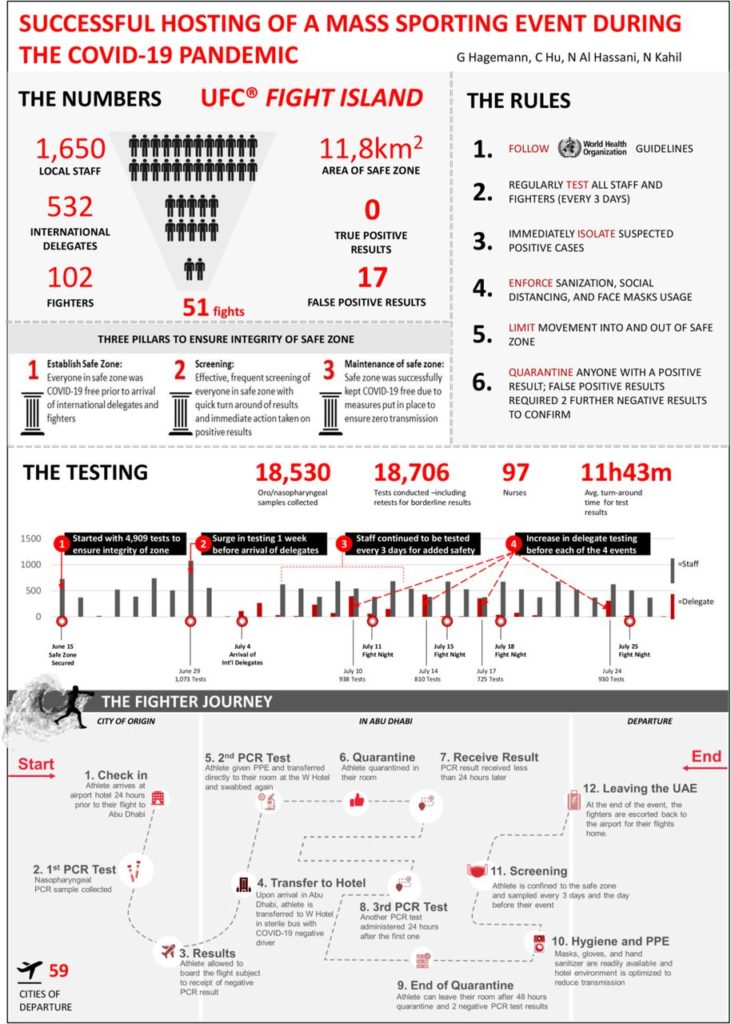Hagemann, G., Hu, C., Hassani, Al, N., & Kahil, N. (2020). British Journal of Sports Medicine,
In a previous BJSM blog posted in April this year Nitin K Sethi posed the question, ‘Amid the COVID-19 pandemic should combat sports events be held ‘behind closed doors’? The article’s conclusion was that with the right preparation and ‘by adopting some of the above practices a cautious start to combat sports events can be contemplated’. Within this context, the Ultimate Fighting Championship (UFC) elected to hold a series of fights on Yas Island, Abu Dhabi, hosted by the Department of Culture and Tourism and in close liaison with the Department of Health, from 01 to 31 July 2020.
According to the WHO Mass Gatherings Risk Assessment COVID-19 Tool, the risk of hosting the event during that time (during the active phase of the pandemic) was considered ‘Very High Risk’.2 3 The decision then to go ahead was one that was not taken lightly, but the event organisers were confident that they could take the right measures, with a strong operational plan, to successfully protect all involved in a city that was particularly well resourced and already effectively dealing with the pandemic at a population level.
The potential for negative press was anticipated, especially should there be an outbreak at the tournament. The communication strategy for the event was thus inclusive of a strong public relations crisis management plan in the case of positive cases being identified or any reason for the safety of the participants being compromised. The trust of the local and international media was gained through involving them in everything and ensuring transparent and continuous communication around all aspects of the event. With the safety of the fighters ensured, the public was only too eager to support the tournament, having been starved of watching world-class sport due to the pandemic.
The Abu Dhabi Department of Health was involved in the tournament throughout, and local guidelines for management of an outbreak would have been followed should the need arise. Should such an ‘outbreak’ be significant enough, the event would have to be cancelled; the threshold for this decision being low.
An area of 11.8 km2 on Yas Island was identified to be turned into a virus free ‘safe zone’. Within this area there were 7 hotels, 29 food and beverage outlets, 8 swimming pools, a golf course, 4 spas and 5 gyms. Two weeks before the launch of UFC ‘Fight Island’, the zone was secured; 1650 local staff went into lockdown and had at least two nasopharyngeal PCR tests performed prior to the start of the event. Any positive testing staff were immediately removed from the safe zone.
This meant that by the time the event was launched on 01 July and an additional 532 international delegates, including fighters and their management teams, started arriving, everyone in the zone was SARS-CoV-2 free. International delegates were quarantined in airport hotels for 48 hours prior to their departure and could only board their planes on receipt of a negative result. One fighter, billed to fight in the main event, returned a positive sample (and was symptomatic), so was excluded from further participation. During travel a strict virus transmission risk mitigation strategy was employed. All passengers were required to wear personal protective equipment (PPE) and follow normal hygiene measures with social distancing, while all Etihad crew and airport staff were quarantined and tested regularly for 2 weeks prior to the flights (as were all bus drivers). One of the Abu Dhabi Airport terminals was made available for the exclusive use of the international delegates.

